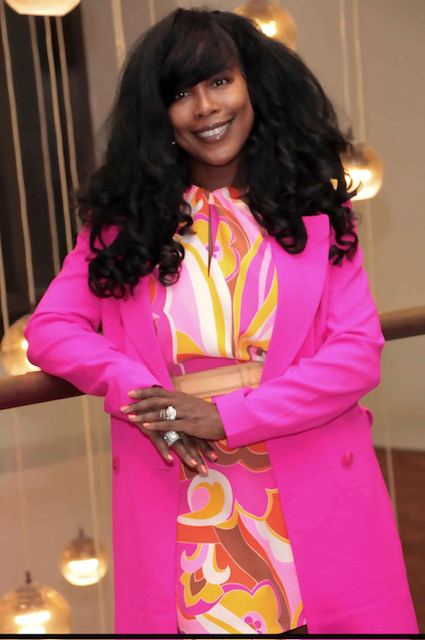Clinical Psychologist Turned Filmmaker Spotlights Societal Injustice to Inspire Change
Dr. Meleeka Clary’s film “Three Corners of Deception” ignites national conversation on judicial deception, transgressions ‘undermining fair and impartial legal system due process’
 Dr. Meleeka Clary is no ordinary Clinical Psychologist. This high—and decidedly diverse—achiever is also a Director, Actress, Model, Singer and Writer who uses her rich background in mental health to fuel a burgeoning career in the entertainment industry. Collectively, she strives for her work is a “beacon of light” for people struggling with life’s obstacles. Her general clinical psychology services range from depression and anxiety treatment to couples and marriage counseling. Of particular note is that Dr. Clary offers her clinical psychology services pro bono, meaning there is no charge to a patient who desires her services but cannot afford to pay.
Dr. Meleeka Clary is no ordinary Clinical Psychologist. This high—and decidedly diverse—achiever is also a Director, Actress, Model, Singer and Writer who uses her rich background in mental health to fuel a burgeoning career in the entertainment industry. Collectively, she strives for her work is a “beacon of light” for people struggling with life’s obstacles. Her general clinical psychology services range from depression and anxiety treatment to couples and marriage counseling. Of particular note is that Dr. Clary offers her clinical psychology services pro bono, meaning there is no charge to a patient who desires her services but cannot afford to pay.
This altruistic spirit focuses on addressing and healing some of society’s more common mental health issues, which has motivated her to amplify her voice through media. In conjunction with her clinical psychology work, Dr. Clary also hosts “The Dr. Meleeka Clary Show” podcast housed on Bold Brave TV. Airing globally every Thursday at 2:00 p.m. eastern, the show is focused on enhancing each listener’s quality of life via positive psychology. The show also offers tips for navigating difficult industries like entertainment, as well as the complex judicial system.
Further extending her voice through media is her new film project titled “Three Corners of Deception,” which she produced and stars in. Based on true events, the film is emotionally visceral, and, with it, Dr. Clary has conveyed a sense of validation and vindication that she has personally experienced.
“I made this movie because I did not feel that my voice was being heard regarding my constitutional rights and civil rights regarding the judicial system,” she says. “I went through a very bad divorce that ended up being very political because I exercised my constitutional rights as a civilian. I was penalized for speaking up when a group of partial judicial officers wanted me to be quiet. Therefore, I had to do something for the powerless. So, I created the ‘Three Corners of Deception’ film based on my experience. Hopefully, with it, I can spotlight a culture of unfair bias that’s an unfortunate, though very real, truth in our judicial system.”
So unique is Dr. Clary’s path from clinical psychologist, to podcaster, to indie filmmaker, I connected with her to hear more about what’s driving her unique journey. Here’s a bit of that conversation.
MK: Before I get to your film, tell me a bit about your work as a clinical psychologist, including the types of services you specialize in?
DC: Yes, I offer psychotherapy. That features a range of different therapy like couples counseling, marriage counseling, relationship building or career path goals, because you don’t need to have a mental disorder just to receive counseling. Some people go to counseling because they’re at an impasse. They want to know what direction to go. Plus, if you’re depressed, or have anxiety, or schizophrenia, or any of those disorders, I provide therapy for those as well. It’s all types of psychotherapy that I provide.
MK: All such important services in today’s world. And, you also have a podcast, so can you provide some detail on that?
DC: Yeah, so the Dr. Meleeka Clary Show on the Bold and Brave TV network, that is about identification of oneself. And, I say that because I interview all types of individuals. You can be a filmmaker, you could be a celebrity, you could be an average person, a taxi driver, I really want to know about you. And, of course, they explain what they do as well. We have a lot of people walking around and they don’t really know who they are. For example, I could sit here and tell you all about me, but then when the door is closed, I’m doing something else, or I don’t feel like that’s who I am. It’s almost like you’re living for someone else. I think we do a lot of that. I want to know, who do you identify yourself as? And, it’s in a positive way.
People talk about challenges because many people, average folks, they think that, ‘Oh, this is celebrity, they got it so easy.’ Well, no, they have challenges. They bleed, they cry, they have testimonies, and so they share. Sharing is caring, I so believe that. I’m glad that people that share their stories and their testimonies on my platform are starting to help other people. That’s why I love the Dr. Meleeka Clary Show, because it’s about positivity, it’s just about you. It’s about things that you can share. What makes you work, what makes you live, what makes you get up in the morning? That something might help another person get up and out of bed in the morning.
MK: I love that. Allowing people to share their experiences and give their testimony will help de- stigmatize the hardships that people are going through. Speaking of spotlighting life’s challenges, your film “Three Corners of Deception” is an exciting project for you—and one that I understand is very personal. How would you sum up when the movie is about?
DC: Yes! “Three Corners of Deception” is a story based on judicial deception. There are things that happened in that movie that happened to me in real life. The movie is a story about how a college law professor and an attorney fell in love over a Las Vegas Memorial Day weekend. They got married shortly thereafter, started a family, only for her to realize he wasn’t the man he said he was, which led to a complete manipulation of the relationship. The marriage ended hastily after a year, only to be carried out in court, which brought even more deception than what was originally thought. Eventually, the court ruled against the mother in every part of the case due to judicial deception with judges, lawyers and lawmen all involved. They were part of the “good ol’ boy network.”
The film has resonated deeply with audiences, sparking discussions surrounding trust, betrayal and the pursuit of justice. I did go around the film festival circuit and it received over 85 recognitions all over the world, different countries. And, for an independent movie, and for this to be my first film, I’m very pleased with those results, alone. One goal of the film is to stimulate vital discussions about the dark underbelly of the legal system that I personally experienced.
MK: Where can folks go to watch it? And, did you find your “voice” through this project to address the situation that motivated its production in the first place?
DC: Well, it’s available currently on Amazon Prime Video and folks can find it on IMDB as well. This movie is a passion project based on true events—it’s something that happened to me. So, if you want to know a little bit about me, go see this movie. But, it’s a movie that I never thought I was actually going to finish. It wasn’t something that I said, “OK, I just woke up and I want to do this type of movie.” It’s a love, it’s a romance and there’s things that have to do with judicial officers. I’m a human rights activist, so I’m really going to speak up about things I do not agree with. I don’t agree with what happened to me. I say that with passion because I didn’t know what was going to happen to me.
I still, to this day, can’t believe what happened to me—and still there’s things going on. I made a movie about it. I have to say that this is God’s gift for me to actually be able to finish this movie, because I’ve had so many obstacles to finish it. It took me about four years to film and it’s an independent movie. It’s not high budget, it’s not a motion picture like Sony or someone like that. It’s an independent movie, I did my best. I tell people, when you watch this movie, it’s a person that felt like something was happening to her and the only way to expose these types of people is to make a movie. That is the only thing I can say. I think a lot of people will like it.
MK: Is it kind of uncomfortable to base something so closely to your own life experiences, and put it out there in a way that’s so revealing and raw. What is that like?
DC: I could say shameless because I could feel ashamed for telling people my story, but that’s what they wanted me to feel. These officers, these bad individuals, they wanted me to feel guilty for sharing my story. I don’t feel that way anymore. I feel like you need to know. I feel released, it’s a release. It’s a flow technique for me. Now, I feel like sharing is caring. And, how would you know if I don’t share this? Now that I’ve been doing this movie and filming and been very public on social media, people all over—even in this county, mainly in this county—are reaching out to me and saying, ‘Hey, that was happening to me as well.’
See, when one speaks up, you start to get more people to follow. That’s the thing that I love the most because it’s happening to other people. I’m not the only one, I’m really not. I am the one that stood up and said, ‘Hey, I’m going to do this.’ I didn’t want to tell people my business. I never even was on social media until 2016. I was being abused and my rights were being taken away from me. I didn’t know what else to do. I was powerless and the powerful were taking advantage of me.
MK: Well, with this film, you’re clearly taking the power back. But, along the way, what obstacles did you inevitably face, and overcome, during production?
DC: Because my movie has judicial officers involved, the judges and lawyers, they were part of the ‘good ol’ boy network.’ It was almost like, ‘You’re not going film in this courthouse because we know those people.’ See, I got pushback in the middle of my filming. It was just like, really? There’s good judges and bad lawyers and good lawyers. That was a huge obstacle because I was just like, ‘OK, there’s nothing I can do. I don’t know what to do.’ That was one challenge, but there were several other challenges. You had to deal with different actors and actresses.
I ran into a lot of things, so we had to change some things around. Unfortunately, that’s part of the business, but I did get the movie completed. I will say this, as being an independent filmmaker, a lot of people don’t have faith in independent films. And, that’s sad because it’s just an independent situation financially. We’re still filmmakers; and we still have a voice; and we still have a story; and we still want to display something creative. I think people should start trying to change their mindset about that.
MK: It’s amazing to have that level of recognition that must be so motivating for you. And, on that note, tell us what’s ahead for you – any other films in the pipeline?
DC: I’m from Boston, so I’m going to film the Boston Girls. I did finish the script, I’m so glad for that. But, we want to just see how this movie does, we want to lift it up. We’re still advertising and letting people know that “Three Corners of Deception” is available, so we have to really do that. But the Boston Girls is the next film and it will be filmed in Boston, where I’m from. I’m so excited about that.
The film “Three Corners of Deception” is clearly a testament to Dr. Clary’s resilience and commitment to using her own experiences as inspiration and to empower others. Resonating with audiences and critics alike, the film is driving broader conversations about relationships, manipulation and the U.S. justice system. It is certainly a thought-provoking narrative.
With a rich background in mental health and now amid a thriving career in the media and entertainment industry, Dr. Clary’s dedication to her patients and artistic achievements have earned her recognition and acclaim in both fields. Perhaps her greatest achievement is that she continues to positively impact the lives of so many from coast to coast. That’s not a career, but rather a legacy.
***Some or all of the accommodations(s), experience(s), item(s) and/or service(s) detailed above may have been provided at no cost and/or arranged to accommodate this review, but all opinions expressed are entirely those of Merilee Kern and have not been influenced in any way as per the disclosure policy on our “Legal” page***

















